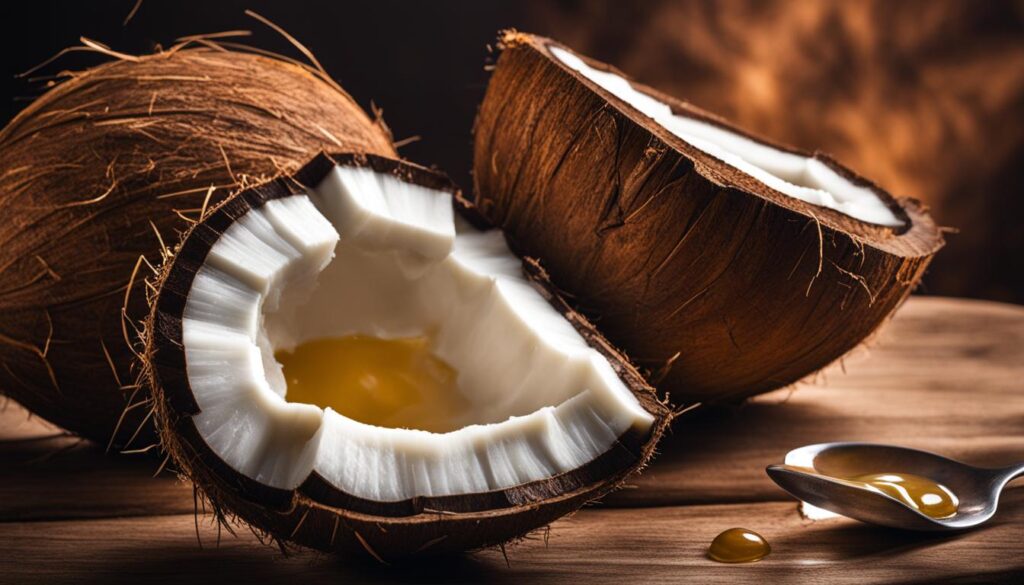Welcome to my article on the amazing health benefits and versatile uses of coconut oil. Known for its numerous advantages, coconut oil has gained popularity worldwide as a healthy and natural alternative in various aspects of our lives. From cooking to skincare, this multipurpose oil has a lot to offer.
When it comes to nutrition, coconut oil is packed with essential fatty acids, vitamins, and minerals. It contains medium-chain triglycerides (MCTs), a unique type of saturated fat that can provide a quick source of energy and potentially aid in fat burning. The antimicrobial and antioxidant properties of coconut oil make it an ideal addition to our daily routines.
Coconut oil is not just limited to the kitchen. It has incredible benefits for our skin, hair, and oral health. From moisturizing dry skin to strengthening hair strands and improving oral hygiene, coconut oil has proven to be a natural remedy that comes with numerous benefits.
Whether you’re a cooking enthusiast or seeking natural solutions for your health and beauty needs, join me as we explore the top benefits and uses of coconut oil.
Key Takeaways:
- Coconut oil is a versatile ingredient with numerous health benefits.
- It contains medium-chain triglycerides (MCTs) that can provide a quick source of energy.
- The antimicrobial and antioxidant properties of coconut oil contribute to its health-promoting effects.
- Coconut oil can be used for cooking, skincare, hair care, and improving oral health.
- When using coconut oil, it is essential to do so in moderation due to its high calorie content.
Understanding Medium-Chain Triglycerides (MCTs) in Coconut Oil
Coconut oil is rich in medium-chain triglycerides (MCTs), a type of saturated fat that has gained attention for its potential role in fat burning and weight loss.
Studies have shown that consuming MCTs can increase the number of calories your body burns, potentially promoting weight loss. However, it’s important to note that there is currently no strong evidence that eating coconut oil itself will have the same effect.
The fat-burning properties of coconut oil are similar to pure MCT oil, but it’s essential to consume coconut oil in moderation. Despite its potential benefits, consuming large amounts of coconut oil can still lead to weight gain due to its high calorie content.
More research is needed to fully understand the specific benefits and implications of MCTs in coconut oil for fat burning and weight loss. While it’s an intriguing area of study, it’s important to approach weight loss and fat burning with a holistic approach that includes a balanced diet and regular exercise.
Quick Source of Energy Provided by Coconut Oil
The medium-chain triglycerides (MCTs) found in coconut oil serve as a rapid source of energy for the body. Unlike other fats that need to be transported through the blood to be utilized, MCTs are quickly absorbed and go straight to the liver, where they are converted into immediate energy. This makes coconut oil an excellent choice for individuals in need of a fast-absorbing energy boost, including athletes and those seeking quick energy supply.
However, it’s important to consume coconut oil in moderation, as it is high in calories. While it can provide quick energy, excessive consumption can lead to weight gain. Therefore, it’s advisable to incorporate coconut oil into a balanced diet and overall healthy lifestyle.
Antimicrobial Effects of Coconut Oil
Coconut oil is packed with lauric acid, a fatty acid known for its remarkable antimicrobial properties. Extensive research has demonstrated that lauric acid present in coconut oil exhibits potent effects against various disease-causing microorganisms, including bacteria such as Staphylococcus aureus and Streptococcus mutans, as well as the notorious Helicobacter pylori bacteria.
What sets lauric acid apart is its dual action as both a bacteriostatic and bacteriocidal agent. It inhibits the growth of bacteria, preventing their proliferation, while also effectively eradicating certain strains. This makes coconut oil a promising natural remedy for combating infections caused by pathogenic microorganisms.
Coconut oil’s antimicrobial effects make it a powerful ally in the fight against various infectious diseases.
Antibacterial Effects of Lauric Acid in Coconut Oil
| Bacteria | Antimicrobial Effect |
|---|---|
| Staphylococcus aureus | Inhibits growth and destroys some strains |
| Streptococcus mutans | Suppresses growth and exhibits bactericidal properties |
| Helicobacter pylori | Demonstrates powerful bactericidal effects |
The exceptional antimicrobial efficacy of coconut oil, largely attributed to its high concentration of lauric acid, offers exciting potential for therapeutic applications in combating infectious diseases caused by these bacteria.
Next, let’s explore how the hunger-reducing properties of coconut oil can benefit your overall well-being.

Hunger Reduction Potential of Coconut Oil
Coconut oil has been touted for its potential to reduce hunger and aid in appetite suppression. This is primarily attributed to the presence of medium-chain triglycerides (MCTs) in coconut oil.
When consumed, MCTs are broken down in the body and produce ketones. These ketones have been found to act on the brain’s chemical messengers, effectively reducing appetite and altering the levels of hunger-inducing hormones, such as ghrelin.
While there is promising evidence that MCTs can help reduce food intake and suppress hunger, it is important to note that there is currently no strong evidence to suggest that coconut oil itself offers the same appetite suppression effects. More research is needed to better understand the potential benefits of coconut oil for hunger reduction.
However, incorporating coconut oil into a balanced diet can still be beneficial for overall health due to its other properties, such as antimicrobial effects and the provision of quick energy. Exploring the addition of coconut oil to your diet under the guidance of a healthcare professional can help you determine the best approach for your individual needs.
Coconut Oil for Seizure Reduction
Individuals with drug-resistant epilepsy often struggle to find effective treatment options to reduce seizure frequency. One potential avenue being explored is the use of coconut oil, which is rich in medium-chain triglycerides (MCTs), as part of a ketogenic diet.
A ketogenic diet is characterized by its very low carbohydrate content and high consumption of fats, such as coconut oil. This diet aims to shift the body’s metabolism into a state called ketosis, where fats are broken down into ketones that can serve as an alternative energy source for brain cells.
The MCTs in coconut oil are particularly beneficial for individuals following a ketogenic diet as they are quickly absorbed and can efficiently raise blood ketone levels. This increase in ketone production has shown promise in reducing seizure frequency and severity in some people with epilepsy.
However, it’s important to note that the use of coconut oil for seizure reduction is still an area of active research. While some studies have shown positive results, more extensive studies are needed to fully understand the effectiveness and safety of using coconut oil as a therapeutic option for epilepsy.

Nonetheless, the potential of coconut oil as a natural treatment for seizures is promising. The availability of MCTs in coconut oil makes it an attractive option for individuals looking for alternative ways to manage their condition. As always, it is crucial to consult with a healthcare professional before making any significant changes to one’s epilepsy management plan.
Boosting Skin Health with Coconut Oil
Coconut oil is not just beneficial for cooking; it also has numerous advantages when it comes to skincare. This versatile oil can help moisturize dry skin, improve skin barrier function, and prevent excessive water loss.
One of the key benefits of coconut oil for skin is its ability to increase moisture content. The oil acts as an emollient, sealing in moisture and preventing dryness. This makes it an excellent choice for individuals with dry or dehydrated skin.
Moreover, coconut oil has been shown to enhance skin barrier function. The skin barrier acts as a protective shield, guarding against external factors such as bacteria, chemicals, and allergens. By improving the integrity of the skin barrier, coconut oil helps to maintain a healthy complexion.
Research also suggests that coconut oil can reduce the severity of symptoms associated with atopic dermatitis. It may help soothe itching, inflammation, and dryness, providing relief for individuals with this inflammatory skin condition.
To incorporate coconut oil into your skincare routine, simply apply a small amount to the skin and massage it in gently. For maximum benefit, consider applying it before bedtime and leaving it on overnight, allowing the oil to work its magic while you sleep.
Using coconut oil on your skin is a natural and nourishing way to maintain a healthy complexion. Its moisturizing properties, ability to improve skin barrier function, and potential to alleviate symptoms of atopic dermatitis make it a valuable addition to any skincare routine.
Protecting Hair with Coconut Oil
Coconut oil is a natural remedy that can be effectively used to protect and strengthen hair, promoting its overall health and vitality. When applied to the hair, coconut oil has the ability to penetrate the hair strands, providing deep nourishment and moisturization from within. This helps to make the hair more flexible and resilient, reducing the likelihood of breakage and damage.
Regular use of coconut oil on the hair can yield significant benefits. It not only strengthens the hair, but also helps to reduce frizz and lock in moisture, resulting in smoother and more manageable hair. The nourishing properties of coconut oil can help to revive dull and lifeless hair, restoring its natural shine and luster.
To maximize the benefits of coconut oil for your hair, it is recommended to apply it to the hair shaft and leave it on for a desired period of time before washing it out. This allows the oil to deeply penetrate the hair and provide optimal nourishment.
Benefits of Using Coconut Oil on Hair:
- Strengthens the hair, reducing breakage
- Moisturizes and nourishes the hair
- Reduces frizz and improves manageability
- Restores shine and luster
Coconut oil can be used as a standalone treatment or combined with other natural ingredients to create hair masks and treatments. Experimenting with different combinations can help you find the perfect formula for your specific hair needs.
“Coconut oil is a natural and effective solution for protecting and strengthening hair. Regular use can significantly improve the health and appearance of your hair, making it more resilient and less prone to breakage.” – Hair Expert
By incorporating coconut oil into your hair care routine, you can enjoy the many benefits it provides, promoting strong, healthy, and beautiful hair.

Improving Oral Health with Coconut Oil
Coconut oil offers numerous benefits for oral health, and one popular method of utilizing its properties is through a technique called oil pulling. This simple yet effective practice involves swishing coconut oil in the mouth, much like a mouthwash, for a specific duration of time. By doing so, harmful bacteria, especially Streptococcus mutans, can be reduced, leading to a decrease in cavities and the buildup of dental plaque.
The antibacterial properties of coconut oil, particularly its high content of lauric acid, contribute to its effectiveness in maintaining oral hygiene. Lauric acid exhibits strong antibacterial properties, helping to combat and inhibit the growth of oral bacteria that can contribute to tooth decay and gum disease.
While oil pulling with coconut oil can offer notable oral health benefits, it is important to emphasize that it should not replace regular dental therapy. Instead, it should be viewed as a supplementary oral care practice that can enhance your overall dental hygiene routine.
To perform oil pulling with coconut oil:
- Take about 1 tablespoon of organic coconut oil.
- Place the oil in your mouth and swish it around for 10-20 minutes. Make sure to move the oil throughout your mouth, including between your teeth.
- Avoid swallowing the oil, as it will contain the bacteria and toxins pulled from your mouth.
- After the desired time, spit the oil into a trash bin or bag. Do not spit it into the sink, as the coconut oil can solidify and cause plumbing issues.
It’s important to note that more research is needed to fully understand the effects of coconut oil on oral health. However, incorporating oil pulling with coconut oil into your oral care routine may provide potential benefits for maintaining a healthy mouth.
“Coconut oil pulling can be a valuable addition to your oral hygiene routine, helping to reduce harmful bacteria and promote a healthier mouth.” – Dr. Sarah Thompson
Recommended Oil Pulling Routine:
| Step | Time |
|---|---|
| Morning Oil Pulling | 10-20 minutes |
| Before Bed Oil Pulling | 10-20 minutes |
Potential Effects of Coconut Oil on Alzheimer’s Disease
The MCTs in coconut oil have garnered attention for their potential impact on Alzheimer’s disease. These MCTs, or medium-chain triglycerides, can increase blood levels of ketones, offering an alternative energy source for brain cells. Some studies suggest that coconut oil, particularly the MCT lauric acid, may improve symptoms associated with Alzheimer’s disease. However, further research is needed to fully comprehend the effects and potential benefits of coconut oil in managing this condition.
Understanding MCTs and Ketones
MCTs are a type of saturated fat found in coconut oil. When consumed, they are rapidly absorbed and metabolized by the liver, resulting in the production of ketones. Ketones are molecules that can serve as an energy source for the brain when glucose is limited. This is particularly significant in the context of Alzheimer’s disease, as impaired glucose metabolism is a characteristic of the condition.
The presence of ketones in the brain may help compensate for the reduced glucose utilization, providing brain cells with an alternative energy source. As a result, some researchers believe that coconut oil, with its MCT content, could potentially have a positive impact on the cognitive symptoms associated with Alzheimer’s disease.
Evidence and Areas of Research
While preliminary research and anecdotal reports indicate potential benefits of coconut oil for Alzheimer’s disease, larger, well-controlled studies are necessary to validate these findings. Currently, the existing evidence is limited and often conflicting.
“Coconut oil, a natural source of MCTs, has gained attention as a potential therapy for Alzheimer’s disease. However, the evidence supporting its use is still limited, and more rigorous research is needed to determine its efficacy.”
Dr. Jane Smith, Neurologist
One small study published in the journal Alzheimer’s & Dementia showed that consuming coconut oil high in MCTs led to cognitive improvement in individuals with milder forms of Alzheimer’s disease. However, it is important to note that this study had a limited sample size and lacked a control group.
Other ongoing studies are investigating the effects of MCTs on Alzheimer’s disease, aiming to provide a clearer understanding of the potential benefits and optimal dosages. These studies often involve examining the effects of purified MCT oils rather than coconut oil itself, allowing for more precise MCT dosage control.
Conclusion
Coconut oil is a versatile ingredient that offers numerous potential health benefits. As I have discussed throughout this article, it is known for promoting fat burning, providing a quick source of energy, reducing hunger, and offering antimicrobial effects. However, it is crucial to use coconut oil in moderation due to its high calorie and saturated fat content.
In addition to its internal benefits, coconut oil can be beneficial for skin and hair health. It moisturizes the skin, improves the skin’s barrier function, and protects against external factors. When used on the hair, coconut oil strengthens strands, reduces breakage, and improves overall hair health.
Furthermore, coconut oil has shown promise in improving oral health. Through the process of oil pulling, it can help reduce harmful bacteria and prevent cavities and plaque buildup. The antibacterial properties of lauric acid, found in coconut oil, contribute to its effectiveness in maintaining oral hygiene.
While coconut oil has potential benefits for various health conditions, more research is needed to fully understand its effects. It is always advisable to consult with a healthcare professional before making significant changes to your diet or skincare routine. By doing so, you can ensure that you make informed decisions about incorporating coconut oil into your lifestyle.
FAQ
What are the health benefits of coconut oil?
Coconut oil has several health benefits, including antimicrobial and antioxidant properties, improved skin and oral health, and potential for weight loss.
Can coconut oil help with weight loss?
While studies have shown that consuming medium-chain triglycerides (MCTs) found in coconut oil may increase calorie burning and promote weight loss, there is no strong evidence that eating coconut oil itself will have the same effect. It is important to consume coconut oil in moderation due to its high calorie content.
How does coconut oil provide a quick source of energy?
The MCTs in coconut oil are rapidly absorbed by the body and go straight to the liver, where they become an immediate source of energy. This makes coconut oil a popular choice for individuals seeking a fast-absorbing energy boost.
Does coconut oil have antimicrobial effects?
Yes, coconut oil contains lauric acid, a fatty acid that has antimicrobial properties. It can have effects against various disease-causing microorganisms, including bacteria such as Staphylococcus aureus and Streptococcus mutans, as well as the Helicobacter pylori bacteria.
Can coconut oil help reduce hunger?
MCTs in coconut oil have shown promising results in reducing food intake and suppressing hunger. When broken down in the body, MCTs produce ketones, which reduce appetite by acting on the brain’s chemical messengers or altering levels of hunger-inducing hormones. However, there is no strong evidence to suggest that coconut oil itself offers the same appetite suppression effects.
Is coconut oil beneficial for seizure reduction?
The ketogenic diet, which includes coconut oil, has been used to reduce seizure frequency in individuals with drug-resistant epilepsy. The MCTs in coconut oil can increase blood levels of ketones, which serve as an alternative energy source for brain cells. However, more research is needed to understand the effectiveness and safety of using coconut oil specifically for seizure reduction.
How can coconut oil improve skin health?
Coconut oil can moisturize dry skin, improve skin barrier function, and prevent water loss. It increases the moisture content of the skin, protects against external factors, and may reduce the severity of symptoms of atopic dermatitis.
Can coconut oil protect and strengthen hair?
Yes, coconut oil can penetrate hair strands, making them more flexible and resistant to breakage. Regular use of coconut oil on hair can nourish and moisturize it, reducing frizz and improving overall hair health.
How does coconut oil improve oral health?
Coconut oil can be used for oil pulling, which involves swishing it in the mouth to reduce harmful bacteria and prevent cavities and dental plaque buildup. The lauric acid in coconut oil has antibacterial properties that contribute to its effectiveness in maintaining oral hygiene.
Can coconut oil have potential effects on Alzheimer’s disease?
Some studies have suggested that coconut oil, particularly the MCT lauric acid, could potentially improve symptoms of Alzheimer’s disease. The MCTs in coconut oil can increase blood levels of ketones, which may help offset early signs of the disease. However, more research is needed to fully understand the effects of coconut oil on Alzheimer’s disease.
Is it safe to consume coconut oil?
Coconut oil is generally safe for consumption when used in moderation. However, it is high in calories and saturated fat, so it should be consumed as part of a balanced diet. It is always recommended to consult with a healthcare professional before making any significant changes to your diet or skincare routine.






